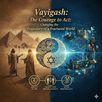The Hardest Lesson for Parents: Letting Go
- Rabbi Yosef Vogel

- Feb 14, 2025
- 2 min read

Sometimes, our good intentions don’t lead to good outcomes. A common example is excessive generosity in a way that ultimately does more harm than good.
The parent-child relationship is one of the most universally relatable human experiences. Parents naturally want what is best for their children. They provide love, security, modern material comforts, a good education, and financial support as their means allow.
On the surface, this seems straightforward. So why do things so often go wrong?
Parent-child relationships are among the most complex. Sigmund Freud even suggested that much of adult development is shaped by early interactions with parents. Yet within this relationship lies a fundamental yet deeply challenging component—one that runs counter to human nature, especially for parents.
Love for our children is perhaps the most powerful and instinctive love we know. But this love, profound as it is, can cloud our judgment. Often, it is precisely because we love our children so much that we struggle to discern what is truly in their best interest.
This week’s Torah portion offers a compelling illustration. Before the revelation at Mount Sinai, we read of an exchange between Moses and his father-in-law, Jethro.
Observing Moses single-handedly resolving disputes among the Jewish people, Jethro asks, “Why do you act alone?” and tells him, “The thing you are doing is not right.” (Exodus 18:14-17).
The Rebbe explains that Moses, out of deep love and devotion, wanted to personally guide the people’s spiritual development. He was unwilling to delegate this responsibility to others who might be less knowledgeable or invested.
Jethro, however, challenges this mindset and convinces Moses that such an approach is neither sustainable nor beneficial. First, human beings need to earn their achievements. As the Talmud states, “A person prefers one measure of their own produce to nine measures of another’s” (Bava Metzia 38:1).
Second, by overprotecting our children and not allowing them to navigate life independently, we deprive them of the ability to mature, realize their potential, and become self-sufficient.
The greatest gift we can give our children is not just love or material comfort—it is the ability to stand on their own, care for themselves, and achieve dignified independence, which is essential for their growth and happiness.






Comments